Experts accuse BBC of anti-intensive farming bias
 © Tim Scrivener
© Tim Scrivener Two experts have accused the BBC of “discouraging an open and evidence-based conversation about sustainable food production” with its “bias towards small-scale, extensive agriculture”.
Retired livestock geneticist professor Helen Sang and consultant Daniel Pearsall said the broadcaster had presented a one-sided view of intensive livestock production in its recent article “More cattle kept in UK ‘megafarms’, BBC finds”.
The article included comments from campaign group Compassion in World Farming about how the reported rise in large-scale cattle farming was symptomatic of a “desperate” and “broken” food system.
But Professor Sang and Mr Pearsall said it contained “no substantiated evidence of poorer standards on large-scale farms.”
The pair, who are involved with the Science for Sustainable Agriculture initiative, made the claims in an article for the organisation’s website.
Their piece said: “For an article included in the ‘Science and Environment’ section of the BBC website, it is disappointing that the BBC did not adopt a more balanced approach.
“And that the potential benefits of large-scale livestock production systems – for more efficient food production, for improved animal health and welfare, and for reduced environmental impact – were not explored in more detail.”
The pair went on to note that in January 2022, Defra chief scientific adviser professor Gideon Henderson told the All Party Parliamentary Group on Science and Technology in Agriculture that reducing grazing on pastureland by rearing ruminant livestock more intensively was one way to reduce livestock emissions.
They also highlighted that the welfare of animals on large-scale units is monitored carefully.
“In contrast to its use in the medical arena, where ‘intensive care’ is positively associated with high standards of precision, monitoring and attention to detail, ‘intensive farming’ brings negative connotations,” they said.
“The BBC’s default position against ‘intensive farming’ raises serious concerns.”
